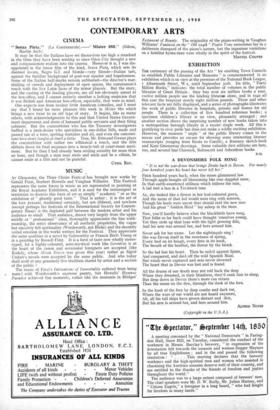MUSIC AT Gloucester, the Three Choirs Festival has brought new
works by Gerald Finzi, Herbert Howells and Vaughan Williams. This Festival represents the same forces in music as are represented in painting at the Royal Academy Exhibition, and it is easy for the intransigent or intolerant to dismiss this form of art as simply " academic " or as the exhibition of "ghastly good taste." That is unfair ; it is the art of the bien pensant, traditional certainly, but not illiberal, and nowhere (except perhaps the festivals of the International Society for Contem- porary Music) is the deplored gulf between the modern artist and his audience so small. That audience, drawn very largely from the upper middle or " professional " class, thoroughly appreciates the fine work- manship, the strict observance of all aesthetic proprieties, the vague but sincerely felt spirituality (Wordsworth, not Blake) and the decently veiled emotion in the works written for the Festival. They appreciate the same qualities in a novel by Galsworthy or Francis Brett Young or in a painting by Russell Flint. It is a form of taste now wholly stereo- typed, for a highly-coloured, semi-mystical work like Gerontius is at the heart of the canon and occasional foreigners are accepted (like Kodaly, whose Missa Brevis was given this year) rather as Sigrid Undset's novels were accepted by the same public. And who today shall scoff at any genuinely live tradition shared by artist and a section of the public ? The music of Finzi's Intimations of Immortality suffered from being • matei with Wordsworth's supreme poetry, but Howells' Hymnus Paradisi achieved fine moments, rather like the moments in Bridges' Testament of Beauty. The originality of the piano-writing in Vaughan Williams' Fantasia on Ike" Old lo4th "Psalm Tune sometimes lay in a deliberate disregard of the piano's nature, but the ingenious variations on a familiar hymn-tune were wholly in the spirit of the festival.
MARTIN COOPER






















 Previous page
Previous page